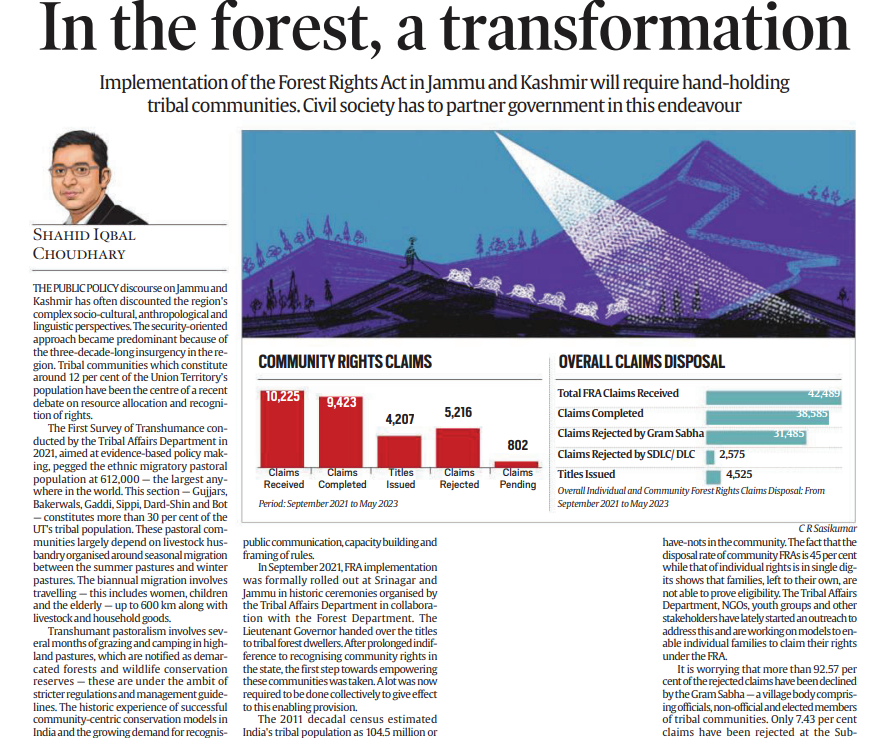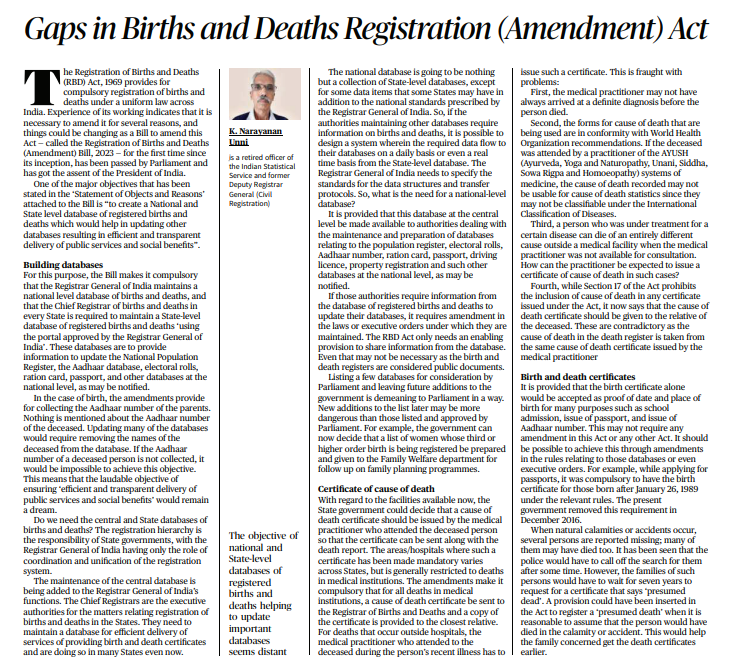The discourse surrounding Jammu and Kashmir’s public policy has traditionally been security-focused, often overshadowing the region’s intricate socio-cultural fabric and the rights of its tribal communities. These tribes, comprising about 12% of the Union Territory’s populace, lead transhumant lifestyles involving extensive migrations.
A turning point came with the Scheduled Tribes and Other Traditional Forest Dwellers (Recognition of Rights) Act of 2006, which sought to recognize and empower these tribes.
- Complexities of Jammu and Kashmir:
- Public policy has often overlooked the region’s socio-cultural, anthropological, and linguistic nuances.
- Security concerns became dominant due to the three-decade-long insurgency.
- Tribal Communities and Resource Allocation:
- Tribes form around 12% of the Union Territory’s population.
- The First Survey of Transhumance in 2021 found 612,000 ethnic migratory pastoral population, the largest globally.
- Tribes like the Gujjars, Bakerwals, and Gaddi constitute over 30% of the UT’s tribal populace.
- Transhumant Pastoralism:
- Biannual migration covering up to 600 km with household goods and livestock.
- Several months spent grazing in highland pastures under strict regulatory zones.
- The Scheduled Tribes and Other Traditional Forest Dwellers (Recognition of Rights) Act 2006:
- Enacted in 2006 and implemented in 2008, it acknowledges tribal rights over forest lands.
- Permitted use of forest lands for services such as healthcare, education, and connectivity.
- Jammu and Kashmir lagged in adopting this Act.
- FRA Implementation in Jammu and Kashmir:
- Only started in 2021 due to applicability of central laws post-2019.
- As of May 2023, 4,500 titles were issued, benefiting 60,000 families.
- Challenges faced include traversing tough terrains, dealing with mobile communities, and overcoming historic feelings of exclusion.
- The Tribal Affairs Department and NGOs are working to help individual families claim their rights.
- Most rejections of claims come from the Gram Sabha, indicating a need for capacity building.
- Recognition of Tribal Rights over Resources:
- In December 2022, a policy was enacted to empower tribal pastoralists to collect and commercialize non-timber forest produce.
- This marked a significant step towards acknowledging tribal rights and promoting sustainability.
- Challenges in Implementing FRA:
- Low literacy rates, especially among migratory tribes, and local socio-cultural issues present challenges.
- The implementation process requires cooperation from both governmental and non-governmental entities to guide tribes in accessing forest resources and ensuring conservation.
In essence, while Jammu and Kashmir have taken steps towards recognizing the rights of tribal communities, especially in terms of forest resources and conservation, there is still significant work to be done. Challenges such as low literacy rates, socio-cultural barriers, and the need for community leadership need to be addressed for effective policy implementation.
Source : Indian Express
Introduction
- The Registration of Births and Deaths (RBD) Act of 1969, which mandates the compulsory registration of births and deaths across India, is undergoing significant changes with the introduction of the Registration of Births and Deaths (Amendment) Bill, 2023.
- The Bill aims to establish a national and state-level database of registered births and deaths to enhance the efficiency and transparency of public service delivery.
National and State-level Databases:
- The Amendment Bill requires the Registrar General of India to maintain a national database of births and deaths, while each state’s Chief Registrar is responsible for maintaining a state-level database using an approved portal.
- These databases are intended to update various national databases like the National Population Register, Aadhaar, electoral rolls, ration cards, and passports.
Role of Aadhaar and Deceased Individuals:
- The amendments mandate the collection of Aadhaar numbers of parents during birth registration, but there is no mention of collecting the Aadhaar number of the deceased.
- Not collecting this information could hinder the objective of updating databases by removing deceased individuals’ names.
- This could impede the efficient and transparent delivery of public services and social benefits.
Central and State Database Necessity:
- While the Amendment Bill proposes the creation of a central-level database under the Registrar General of India’s jurisdiction, it raises questions about the need for a separate national database.
- The existing state-level databases could potentially serve the purpose of sharing information with other databases.
- The Bill’s requirement for a national-level database might not be necessary, considering the data flow possibilities from state-level databases to other national databases.
Sharing of Database Information:
- The Bill suggests that the central-level database should be accessible to authorities dealing with various national databases, such as population registers, Aadhaar, electoral rolls, etc.
- However, enabling provisions for sharing this information already exist in the RBD Act. Listing specific databases for consideration by Parliament while allowing future additions by the government might undermine parliamentary authority.
Cause of Death Certificate Challenges:
- The Amendment Bill introduces requirements for cause of death certificates, including those issued by medical practitioners. However, issuing these certificates presents challenges, as practitioners may not have reached a definitive diagnosis before a person’s death.
- Additionally, certain alternative medical practitioners’ diagnoses might not align with standardized classifications.
- The issue of issuing a cause of death certificate becomes more complex when the deceased was not attended by a medical practitioner at the time of death.
Birth and Death Certificates as Proof:
- The Bill proposes that birth certificates alone serve as proof of date and place of birth for various purposes like school admissions, passports, and Aadhaar issuance.
- This objective could potentially be achieved through amendments in rules governing these databases, rather than amending the RBD Act.
Presumed Death in Calamities:
- In cases of natural disasters or accidents where individuals go missing and are presumed dead, the current Act does not facilitate the issuance of death certificates.
- Families often have to wait seven years to request a ‘presumed dead’ certificate.
- The Amendment Bill could have included provisions for registering a ‘presumed death’ in cases where it’s reasonable to assume that individuals have died due to calamities or accidents, thereby expediting the issuance of death certificates for such cases.
Conclusion:
The Registration of Births and Deaths (Amendment) Bill, 2023, seeks to establish a national and state-level database of registered births and deaths for enhanced service delivery.
While it aims to address certain issues, such as the cause of death certificate and the use of birth certificates as proof, questions arise regarding the necessity of a separate national database and the potential implications of sharing database information.
Source: The Hindu



